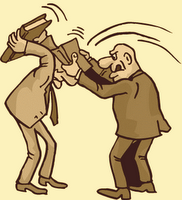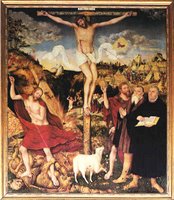Christian (dis-)Unity
Q: While I believe in Christ and His forgiveness, I wonder why, when He prayed for our unity in John 17, are we Christians are so fragmented? How do we determine who believes and teaches correctly?
 A: Sadly, disunity is the norm for Christendom, as well among the cults and sects that call themselves Christian but are not. The confusion among various groups claiming to be Christ’s Church seems almost as great as was the confusion God created at Babel tower.
A: Sadly, disunity is the norm for Christendom, as well among the cults and sects that call themselves Christian but are not. The confusion among various groups claiming to be Christ’s Church seems almost as great as was the confusion God created at Babel tower.We shouldn’t be surprised that there are problems, for Scripture warns of false teachings and false teachers who grow like cancer in the Body of Christ (e.g., Matthew 24:23-24; 2 Corinthians 11:12-15; 1 Timothy 1:3-7; 2 Peter 2:1-3). Not only church bodies, cults, and sects are affected — individual congregations may also become fractured and contentious. Against such attitudes Paul scolded the church in Corinth (1 Corinthians 1:10-17).
Some, especially participants in the Ecumenical Movement, consider disunity to be the greatest scandal of Christianity. Yet, immediately after calling for unity in Corinth, Paul confessed and commended the single most divisive aspect of Christianity. While other divisions may be sin-related and scandalous within and without, the apostle identified the great “stumbling block” (Greek: skandalon) that divides. Nothing less than “Christ crucified (1 Corinthians 1:23)” is the ultimate barrier to a united Christendom. God in human flesh, God who dies — especially such an ignoble death — this simple truth insults all who don’t believe and who face eternal condemnation. How Christians accept, interpret, and apply the fact of “Christ crucified” determines how we evaluate and associate with each other and with the unbelieving world.
 Ultimately, of course, there is only one truth, as Jesus so named Himself: “I am the way, and the truth, and the life. No one comes to the Father except through me. (John 14:6)” Some who appear to be disunited Christians completely deny this truth. They are actually non-Christians wearing the cloak of Christianity.
Ultimately, of course, there is only one truth, as Jesus so named Himself: “I am the way, and the truth, and the life. No one comes to the Father except through me. (John 14:6)” Some who appear to be disunited Christians completely deny this truth. They are actually non-Christians wearing the cloak of Christianity.Some churches deny Christ’s deity. Others say that Jesus, the Father, and the Holy Ghost are three different gods. Still others claim that there is one God, but a Trinity in name only, so what He reveals as three persons in Scripture is actually one god wearing three “masks” or personalities. To separate ourselves from the false teachers, Christians examine what they say about Jesus Christ. When you do so, you’ll see that some of these churches — even some having “Jesus Christ” or “Christian” in their official name — stand outside the Christian Faith.
After hearing what others say about Him, ask them, “How do you proclaim Christ’s work?” Do they confess Him as “the Savior of the world (1 John 4:14)”? Do they include any other name, any other way, by which people are saved (Acts 4:12)? If they teach that anything or anyone but Jesus paid the full price for our sins, these teachers stand outside the Christian Church. Do they mix faith and works (Ephesians 2:8-9) or neglect works entirely in the life of the Christian (2:10)? Do they proclaim multiple paths to eternal life? True Christianity teaches what Jesus taught: There is one Way, one Truth, one Life — one Way to the Father — and Jesus Christ is It. These divisions must remain until error is rejected and truth embraced.
 Other divisions came about through geography, language, or politics. While a result of sin, especially as judged at Babel (Genesis 11:1-9), these linguistic and geopolitical differences are not, of themselves, sinful. Yet even though this disunity comes because of non-doctrinal barriers, we may still have difficulty overcoming them. Sometimes we can only go so far in working and worshiping together, no matter how much belief we hold in common. For example, many different branches of the Orthodox (Eastern) Church are in full communion with each other, agreeing totally on doctrine and practice. However, they don’t regularly meet or worship together because of ethnic, linguistic, or geographic differences. The same is true among many Lutherans, Anglicans (Episcopalians), and others.
Other divisions came about through geography, language, or politics. While a result of sin, especially as judged at Babel (Genesis 11:1-9), these linguistic and geopolitical differences are not, of themselves, sinful. Yet even though this disunity comes because of non-doctrinal barriers, we may still have difficulty overcoming them. Sometimes we can only go so far in working and worshiping together, no matter how much belief we hold in common. For example, many different branches of the Orthodox (Eastern) Church are in full communion with each other, agreeing totally on doctrine and practice. However, they don’t regularly meet or worship together because of ethnic, linguistic, or geographic differences. The same is true among many Lutherans, Anglicans (Episcopalians), and others.The greatest fragmentation occurs in “mainline” Protestantism and its branches. It seems worst among those bodies who emphasize individual relationships with God above the unity of the Church and the oneness of the Body of Christ. Among these, style often divides more than substance. If you don’t care for the worship style, start your own church. If you dislike the minister, start your own church. Doctrine among these assemblies often is less important than feelings.
Finally, how do we (and others) define and teach Christian doctrine? What “essential” doctrines do we refuse to surrender? Are there teachings about which we may disagree? The Bible speaks clearly of baptismal regeneration, yet many deny that Baptism washes sin away and makes people into Christians through the power of God’s holy Word. Christ calls pastors to forgive sinners in His name, yet many refuse to accept this absolution. He tells us that in Holy Communion He gives us His very body and blood to eat and to drink, yet many claim that the Lord’s Supper is only a symbolic action involving only bread and wine.
Not all wrong assumptions about Christ or Scripture condemn people to hell. Even among blatant errorists, whose false and confusing teachings divide them from full Scriptural truth, these errors don’t always stand in the way of eternal life. Folks may get a lot wrong, but if they get Jesus right, they are saved. However, false teachings cause many problems in this life and may bring weaker Christians to stumble in their faith. They can weaken belief, lead people to trust at least partially in their own works for salvation, or remove the confidence that the Spirit builds through Word and Sacraments.
Because of this, true Christians continue to contend for Christ’s truth. A “small” error, left unchecked, won’t remain small and certainly will not go away. It grows larger, sending sinful branches in many directions. While we struggle for earthly unity, Christians should never do so at the expense of unity with God and his pure Word. As much as Satan must enjoy our current fragmentation, a united “church” believing little of God’s truth might please him even more.
 While difficult, the struggle isn’t our own. Christ prayed for the Church’s unity in John 17, particularly verses 20-23. He continues to this day to mediate on our behalf, sending the Holy Ghost that we might be one as He and His Father are one. God began the reversal of Babel’s confusion with the Spirit’s coming at Pentecost (Acts 2:1-12). The Spirit continues the process of unifying all the sheep under one Shepherd. The completion of this task will not come in Time; we await its fullness in Eternity. Until then, true believers will continue to “test the spirits” to see if they are truly “from God. (1 John 4:1)”
While difficult, the struggle isn’t our own. Christ prayed for the Church’s unity in John 17, particularly verses 20-23. He continues to this day to mediate on our behalf, sending the Holy Ghost that we might be one as He and His Father are one. God began the reversal of Babel’s confusion with the Spirit’s coming at Pentecost (Acts 2:1-12). The Spirit continues the process of unifying all the sheep under one Shepherd. The completion of this task will not come in Time; we await its fullness in Eternity. Until then, true believers will continue to “test the spirits” to see if they are truly “from God. (1 John 4:1)”We must remember that in John 17, Jesus also prayed that the believers would be “sanctified in truth (v. 19)” and kept safe “from the evil one (v. 15)” He wants all who believe in Him to be with Him forever, gazing upon the glory His Father gave Him “before the foundation of the world (v. 24)” Since we still live in a sin-filled world, our embrace of the truth may prevent full unity. It can even create greater division, for Jesus warned that His Gospel would divide even families: “Brother will deliver brother over to death, and the father his child, and children will rise against parents and have them put to death. And you will be hated by all for my name’s sake. (Mark 13:12-13)”
Still, however, the Holy Spirit continues to be our Guide as we search and compare the Scriptures (cf. Acts 17:10-11). He will apply the true words of Scripture through faithful pastors and teachers for our great benefit, even if not all listen to them (1 Timothy 4:1-4). For those who embrace the fullness of Christ’s truth, we will, even in Time, experience a good measure of the unity that will be fully ours in Eternity.
Scripture quoted from The Holy Bible, English Standard Version™, © 2001 by Crossway Bibles.
Send email to Ask the Pastor.
Walter Snyder is the pastor of Holy Cross Lutheran Church, Emma, Missouri and coauthor of the book What Do Lutherans Believe.
Technorati Tags: Christian unity | Ecumenical Movement | Ecumenism | Christian | truth | doctrine | unionism | syncretism | sects | cults | heresies

0 Comments:
Post a Comment
<< Home